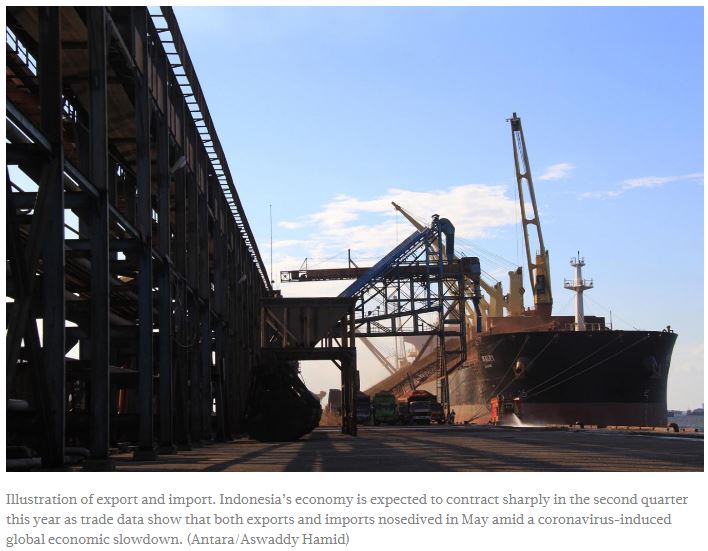Indonesia: Trade data point to severe economic contraction in Q2: Economists
Indonesia’s economy is expected to contract sharply in the second quarter this year as trade data show that both exports and imports nosedived in May amid a coronavirus-induced global economic slowdown.
Economists have warned that falling imports in all goods categories point to lower demand and weaker manufacturing activities as well as investment, which will have a severe impact on the economy. Household spending and investment account for more than 70 percent of Indonesia’s gross domestic product (GDP).
“On that basis, we expect household spending and investment growth to contract, so second-quarter economic growth is projected to shrink by 2 percent to 3 percent,” Bank Permata economist Josua Pardede said via text message on Monday.
Indonesian imports plummeted to US$8.44 billion in May, down 42.2 percent from the same period last year, Statistics Indonesia announced on Monday. Imports of raw and intermediary materials, which account for more than 70 percent of total imports, plunged by 43.03 percent year-on-year (yoy) to $6.11 billion.
At the same time, imports of consumer goods and capital goods tumbled by 39.83 percent and 40 percent yoy, respectively.
Exports, meanwhile, fell 28.95 percent yoy in May to $10.53 billion, their lowest level since July 2016, due to reduced shipments of coal, coffee, palm oil, as well as oil and gas.
With imports falling more than exports, the country achieved a trade surplus of $2.09 billion for the month.
Lockdowns and social distancing measures implemented in countries around the world to contain the coronavirus spread have sapped global commerce and hit economic growth, disrupting supply chains and forcing factories and stores to shut down.
The World Trade Organization (WTO) has projected that global trade will shrink by between 13 and 32 percent as the economic impact of the health crisis remains uncertain.
“The [May export and import] data is surprising, as [trade] fell more than expected,” said Mirae Asset Sekuritas Indonesia economist Anthony Kevin in a phone conversation on Monday.
“It shows that people’s purchasing power is deteriorating faster than thought,” he said, adding that he expected the economy to contract by 2 percent in the second quarter, more steeply than his previous projection of a 1.5 percent contraction.
Indonesia’s gross domestic product (GDP) grew by 2.97 percent yoy in the first three months of the year, the weakest quarterly growth since 2001, as household spending and investment growth slowed.
The government expects the economy to grow at 2.3 percent this year under the baseline scenario, or contract by 0.4 percent under the worst-case scenario, which compares to growth of 5.02 percent recorded in 2019.
“The government’s fiscal policy is crucial to prevent a more severe economic contraction,” Bank Central Asia (BCA) chief economist David Sumual said. He urged the government to expedite spending in the second quarter to stimulate the economy, as he projected GDP growth to contract by around 3 percent in the second quarter.
The government has unveiled Rp 677.2 trillion ($47.6 billion) worth of stimulus spending to strengthen the healthcare system, direct more funds toward social protection to boost consumption and provide incentives to rescue Indonesian businesses from bankruptcy and workers from layoffs.
David said exports and imports may have hit the bottom in May, as Indonesia and its trading partners had begun to relax social restrictions and lockdowns this month.
“Recovery in trade activities will largely depend on the trajectory of the virus and whether there will be a second wave in Indonesia or in its trading partners,” he said.
Indonesia recorded a trade surplus of $4.31 billion during the first five months of the year, which compares to a deficit of $2.68 billion in the same period last year, the BPS data show.
Given the surplus, Bank Indonesia head of monetary operations Nanang Hendarsah said the current account deficit (CAD) would be less than 2 percent of the GDP in 2020, lower than the central bank’s initial projection of 2.5 to 3 percent.
“We see room for the rupiah to strengthen further to reflect its fundamentals and smooth the market mechanism,” Nanang said as quoted by Tempo.co.
The rupiah traded at 14,115 per US dollar on Monday afternoon as the currency has gained around 17 percent since early April.
Anthony of Mirae, however, took the optimism with a grain of salt, as he said the rupiah valuation was connected to economic growth. If the rupiah stood at around Rp 14,000 against the greenback while the economy grew at 5 percent, it was quite impossible to have it at Rp 13,000 when the economy contracts, he said.
“Although the trade balance was in surplus, it should have reflected the weak domestic purchasing power,” he said, projecting that the rupiah would take a hit in the next months after listed companies release their financial reports, which are expected to be weak, leading to foreign capital outflows. (prm)
Source: https://www.thejakartapost.com/news/2020/06/16/trade-data-point-to-severe-economic-contraction-in-q2-economists.html


 English
English




